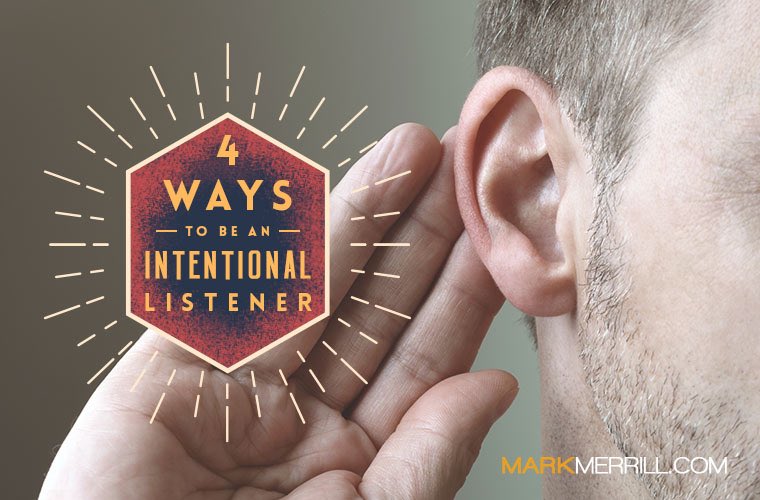I have to confess that after 27 years of marriage, with many lessons learned and advice shared about marriage and family leadership, I’m still learning right along with you. I’m still learning to listen after all these years.
But my listening skills are actually only part of the issue. I’m learning that how well I listen, and show that I’m listening, is directly tied to how well I understand Susan, which is a big need in her heart. Here’s my most recent example:
Several weeks ago, shortly before our daughter’s wedding, Susan was feeling overwhelmed by the planning, a new book she was starting to write, and the daily grind at work. One evening, she started pouring out her heart to me. I thought to myself, I’m going to do what I advise others to do and be a good listener. So for the next five minutes, I didn’t say a word! I was just listening, intently. Ten minutes passed…still not a peep from me. Then 15. After 20 minutes of her sharing, while I was feeling quite proud of my strategic silence, she shocked me by saying “You don’t even care, do you?”
I was like, “what?! I haven’t said anything. I’ve been trying to be a good listener. I wasn’t interrupting you to ‘fix things, like I normally do.” She responded, “you need to be an ‘intentional listener;’ an ‘active listener’ and say things like, “I’m so sorry, tell me more or that must be really hard.” So, after 27 years I’m still learning. And I do this for a living!
Listening is so much more than just being silent. Author Stephen Covey once said, “Most people do not listen with the intent to understand; they listen with the intent to reply.” If I am just listening for an opening to say something to Susan, I’m probably not listening for understanding. And I’m missing an opportunity to strengthen my marriage and love my wife effectively.
I have a friend who has spent years studying communication, and he recently mentioned the concept of active and intentional listening. He and his wife had learned about it while they were dating in college, and still use these techniques over 20 years later.
Active listening is making an effort to understand the person you’re talking to, not just hear the words they’re saying. Here are a few essentials to becoming an intentional listener:
1. Stay Focused and Clear of Distractions:
Have you ever been talking to someone who seems preoccupied with something else in the room, or just mentally seems to be somewhere else? Maintaining eye contact, and clearing your mind to concentrate on their words, is an essential step to being an active listener.
2. Respond in Ways that Show You’re Listening:
You can demonstrate how focused you are and how well you’re listening through more than just opening your ears and focusing your mind.
- Eyes – Maintaining eye contact shows your focus is on the other person. Also, the expressions of the eyes also can communicate sympathy, empathy, and other emotional responses that help your spouse know you’re “getting it.”
- Hands – A meaningful and appropriate touch of the hand to your spouse can also show you’re listening. But touch is also helpful to communicate sympathy, empathy, and affirmation, too.
- Nodding Your Head – This can be an effective way to communicate, “yes, I’m hearing and understanding you.” My friends confess that when they nod their head, the other sometimes asks “Wait…have we already talked about this?” Their running joke for years has been to reply, “No, I’m just active listening.” NOTE: If you are in sharp disagreement about something your spouse is saying, be sure to clarify at some point that your head nodding is not meant to communicate agreement. Otherwise, you run the risk of being misunderstood as well.
3. Repeat Their Facts, but Acknowledge Their Emotions:
It’s very helpful to repeat back to your spouse what you thought you heard them say, in your own words. But when you also acknowledge the emotion you sense they also have (even if you don’t agree with their reaction), it shows them that you heard more than words, you felt their heart. It’s important to understand good techniques when communicating with your spouse.
4. When Understanding is Clear, Offer Your Support and Help:
“How can I help?” is likely better than “Here’s what you need to do….” One way I can blunt the urge to fix everything is to simply offer my support by asking Susan what she needs from me instead of assuming I know.
In my earlier example, I could have taken her hand and said to Susan, “Wow, it sounds like you’re saying that all these demands on your time are exhausting. I understand how you could feel that way, but I want you to know you’re doing a great job, and I’m proud of you. How can I help you more?”
How do you show someone you’re listening? How has someone shown you that they “get you”? Share your thoughts below.



